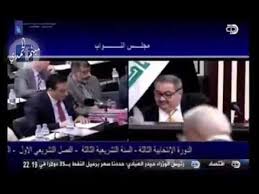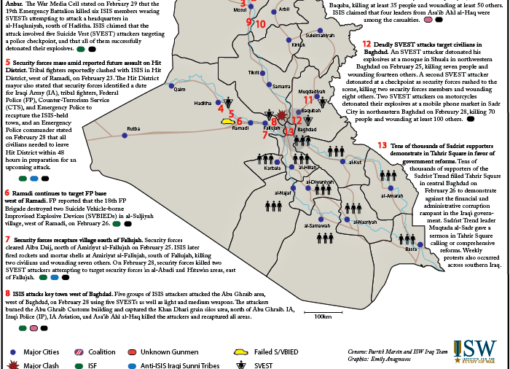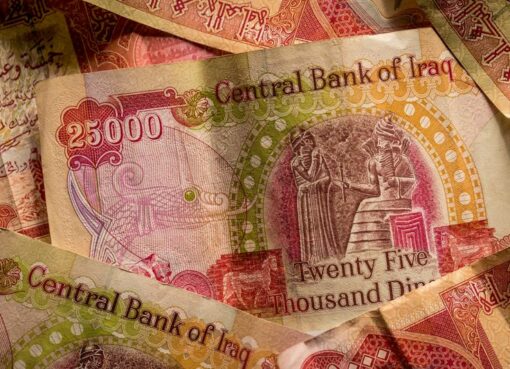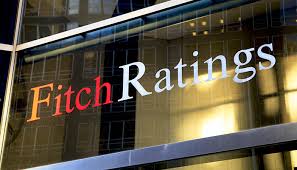
The Iraqi Council of Representatives (CoR) voted out Kurdish Finance Minister Hoshyar Zebari in a vote of no-confidence rendered by simple majority on September 21. The vote was held by a secret ballot in a vote of 158 to 77.
The Iraqi Constitution (Article 61.8.A) mandates that a minister be dismissed on the basis of an absolute majority, which is 165 CoR members. The vote was rendered therefore in a simple majority, the same method that the CoR dismissed Defense Minister Khalid al-Obeidi on August 25. CoR Speaker Salim al-Juburi denied a request from 102 CoR members for re-vote on whether to proceed from the questioning session, held on August 25, to a vote of no-confidence. Juburi also denied a request from Prime Minister Haidar al-Abadi to postpone the no-confidence vote. PM Abadi argued that Zebari is critical to Iraq’s ongoing negotiations with the International Monetary Fund (IMF) regarding major international loan agreements. Juburi likewise denied a request from 50 CoR members to postpone the vote.
The Kurdistan Alliance has effectively collapsed, due intra-Kurdish tensions in the Kurdistan Regional Government (KRG) that spilled into politics in Baghdad. Kurdish political parties have varying interests in Arbil, but they have historically agreed to present a unified platform in Baghdad in order to exact concession for the KRG. However, tensions between Zebari’s party, the Kurdistan Democratic Party (KDP), and a Kurdish opposition party, Gorran, in the KRG have escalated and now affect politics in Baghdad. The Patriotic Union of Kurdistan (PUK) has split loyalties in the dispute, and this internal fracture has failed to prevent the vote from succeeding. Early reports suggest that most non-KDP Kurdish CoR members voted to dismiss Zebari, likely in order to punish the KDP. The KDP issued a statement calling the dismissal a “violation of the Constitution and the law.” The fracture of the Kurdistan Alliance will deprive all Kurdish parties their ability to influence politics in the Iraqi Government.
Former Prime Minister Nouri al-Maliki’s shadow party, the Reform Front, spearheaded the vote, as it did for Defense Minister Khalid al-Obeidi. Maliki hit on fault lines in the Kurdistan Alliance in order to benefit his own interests. Maliki is seeking allies that can support a bid for the premiership and has repeatedly courted the PUK and Gorran to join his support base. He is also targeting ministers who are key allies for PM Abadi in an effort to undermine Abadi’s premiership.
ISW has previously assessed the implications of Zebari’s dismissal. These include:
- Zebari dismissal could compromise ongoing financial negotiations that are critical for Iraq’s economic stability. This includes ongoing discussions with the International Monetary Fund (IMF), which are scheduled to resume in Washington, D.C., in early October. Zebari has been instrumental for obtaining the $5.3 billion standby loan. His absence may prevent Iraq from unlocking greater loan amounts and addressing Iraq’s overall financial crisis.
- The U.S. campaign for Mosul could suffer if the KDP and Baghdad, two of the U.S.’s major ground partners, no longer have an effective relationship. The breakdown of relations between the KDP and the Iraqi Government may complicate the current plan and timeline for Mosul. The majority of anti-ISIS operations in northern Iraq have occurred in KDP-governed terrain and alongside KDP-Peshmerga, who will be the primarily Peshmerga force to participate in Mosul operations, which are intended to launch in the upcoming months. The KDP made “historic” agreements with Baghdad on September 19 over coordination and force composition in the Mosul operations. If the KDP rejects the oversight of the federal government, or if the U.S.’s ability to work with the KDP is hampered by poor Baghdad-Arbil relations, the timeline or success of the Mosul operations may suffer. The KDP may also use poor relations with Baghdad to rebuff plans for the post-ISIS administration of Mosul that do not include Kurdish governance. The KDP may also push to expand Kurdish territory outside of the KRG’s boundaries.
- Maliki and the Reform Front may ultimate target PM Abadi with a no-confidence vote. Maliki and the Reform Front has now successfully engineered the unconstitutional removal of two ministers, putting the survival of any minister in the Iraqi Government at stake. Zebari and Defense Minister Obeidi were two of PM Abadi’s important allies in the Iraqi Government. Maliki’s ability to remove PM Abadi’s allies and gain support for himself could prompt a call for a dismissal of PM Abadi. Without the support of the Kurdish and Sunni parties, PM Abadi may have insufficient support to ensure he survives the vote.
- The split between the Kurdish parties jeopardizes a push for Kurdish independence because an independence referendum would require the support of all Kurdish parties. An independent Iraqi Kurdistan without the PUK-governed territories – primarily the oil-rich Kirkuk Province – is not financially viable. The PUK, which controls half of the Kurdish territories, may block attempts by the KDP to declare independence because the move would be spearheaded by KRG President Masoud Barzani and the KDP. Kurdish independence is less likely, though Barzani will escalate calls for a referendum. However the KDP could still withdraw from Iraqi Government. This will further remove an obstacle for Maliki to gain overarching influence in the CoR and move to retake the premiership.
Source: Institute for the Study of War (IWS), September 21, 2016







Comment here